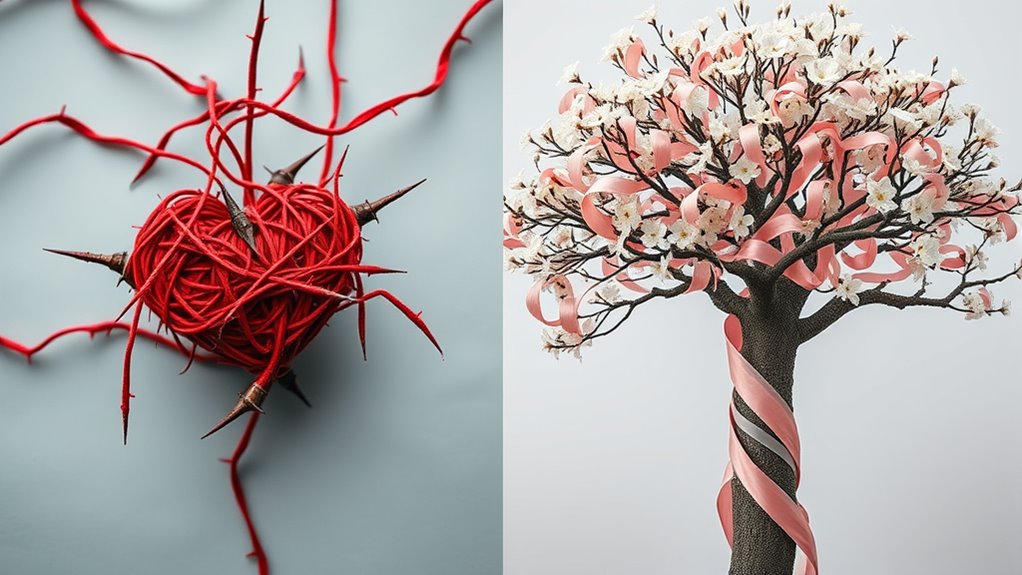Understanding the difference between love addiction and healthy love helps protect your emotional well-being. Love addiction involves dependency, clinginess, and a need for constant validation, often fueled by attachment insecurities. In contrast, healthy love is rooted in trust, mutual respect, and emotional independence. Instead of feeling incomplete without your partner, you maintain your identity and confidence. To recognize warning signs and foster fulfilling relationships, keep exploring these key distinctions as you continue your journey toward healthier connections.
Key Takeaways
- Healthy love is based on mutual respect, trust, and emotional independence, while love addiction relies on dependency and validation.
- Love addiction often involves obsessive checking, clinginess, and fear of abandonment; healthy love fosters security without obsession.
- Emotional dependency in love addiction causes highs and lows, whereas healthy love maintains consistent emotional security.
- Secure attachment promotes confidence and autonomy, reducing the risk of heartache associated with love addiction.
- Recognizing signs like obsessive behavior and lack of self-worth helps distinguish love addiction from genuine, balanced love.

When it comes to relationships, distinguishing between love addiction and healthy love is essential. Love addiction often stems from emotional dependency, where your sense of self-worth becomes tied to your partner’s presence and approval. You might find yourself constantly craving reassurance, feeling anxious when you’re apart, or obsessively checking for signs of love from your partner. This behavior isn’t just about caring deeply; it’s about needing someone to fill an internal void. Your attachment style plays a significant role here—if you have an anxious attachment style, you’re more likely to cling to relationships out of fear of abandonment. You may stay in unhealthy situations because the idea of being alone feels unbearable, even if the relationship is damaging. Love addiction creates a cycle where your happiness depends on your partner’s actions, which leads to emotional highs and devastating lows. This dependency can distort your perception of love, making you believe that being with someone is the only way to feel complete or secure. Recognizing signs of emotional dependency can help you understand how attachment styles influence your relationship patterns.
In contrast, healthy love is rooted in emotional independence and secure attachment. When you experience healthy love, you feel confident and whole within yourself, regardless of your relationship status. You’re capable of enjoying your own company, pursuing your interests, and maintaining your identity outside of the partnership. Your attachment style in healthy love is secure—meaning you trust your partner and yourself, and you’re comfortable with intimacy without feeling overwhelmed or anxious. You communicate openly about your needs and boundaries, and you respect your partner’s independence as well. This form of love fosters mutual growth, where both partners support each other without losing their individuality. You’re motivated by genuine affection and respect rather than fear of loneliness or rejection. The focus is on building a balanced connection where both people feel valued and understood.
Understanding the difference between love addiction and healthy love helps you recognize patterns that may be harming you. If you notice signs of emotional dependency, such as obsessing over your partner’s actions or feeling anxious when apart, it’s a cue to reevaluate your attachment style and emotional health. Developing self-awareness allows you to foster healthier relationships where love is based on mutual respect, trust, and independence. Remember, true love doesn’t require constant validation or sacrificing your well-being; it’s about feeling secure within yourself and sharing that security with someone else. Recognizing these distinctions empowers you to make choices that lead to fulfilling, resilient relationships instead of heartache driven by dependency.
Frequently Asked Questions
Can Love Addiction Develop Suddenly or Is It Gradual?
Love addiction usually develops gradually rather than suddenly, as emotional dependency deepens over time. Your attachment style influences this process, making you more vulnerable if you seek constant reassurance or fear abandonment. You might not notice the shift until it’s well established, but understanding your emotional patterns can help you identify early signs. Recognizing these changes allows you to address unhealthy attachment habits before they become a full-blown love addiction.
How Can I Support a Partner Struggling With Love Addiction?
You can support your partner by gently recognizing their codependency patterns and understanding their attachment styles. Encourage open conversations without judgment, and suggest they seek professional help if needed. Be patient and consistent, showing them stability and reassurance. Remember, your support is essential, but they need to work on their own growth. Stay empathetic, set healthy boundaries, and promote self-awareness to help them navigate their love addiction.
Are There Specific Signs That Differentiate Love Addiction From Obsession?
Did you know that around 60% of people with emotional dependency struggle with love addiction? Signs that differentiate love addiction from obsession include excessive attachment, needing constant reassurance, and feeling anxious without your partner. Unlike healthy attachment, love addiction stems from insecure attachment styles, leading to compulsive behaviors. Spotting these signs helps you understand if your feelings are healthy or if emotional dependency is taking over your relationship.
What Are Effective Ways to Heal From Love Addiction?
To heal from love addiction, focus on emotional healing and establishing healthy boundaries. Practice self-care strategies like journaling, mindfulness, and seeking support from a therapist. Identify underlying issues fueling your dependency, and work on building self-esteem and independence. Prioritize your well-being over unhealthy attachments, and give yourself time to recover. Remember, healing is a process—be patient and compassionate with yourself as you move toward healthier relationship patterns.
Can Therapy Completely Eliminate Love Addiction Tendencies?
Sometimes, it feels like therapy is the key to ending emotional dependency, but it’s more about understanding your attachment styles and patterns. While therapy can substantially reduce love addiction tendencies, it might not completely eliminate them. Instead, it helps you develop healthier relationship habits, giving you tools to manage emotional dependencies. Remember, healing is a journey, and therapy is a valuable part of that process, not a quick fix.
Conclusion
Understanding the difference between love addiction and healthy love can save you from unnecessary heartache. Some experts suggest that love addiction mimics dependency, activating the same brain areas as substance abuse. By recognizing these signs early, you can nurture genuine connections instead of chasing fleeting fixations. Trust that healthy love is rooted in mutual respect and growth, not obsession. Stay mindful, listen to your instincts, and remember—true love enriches your life without draining your spirit.









